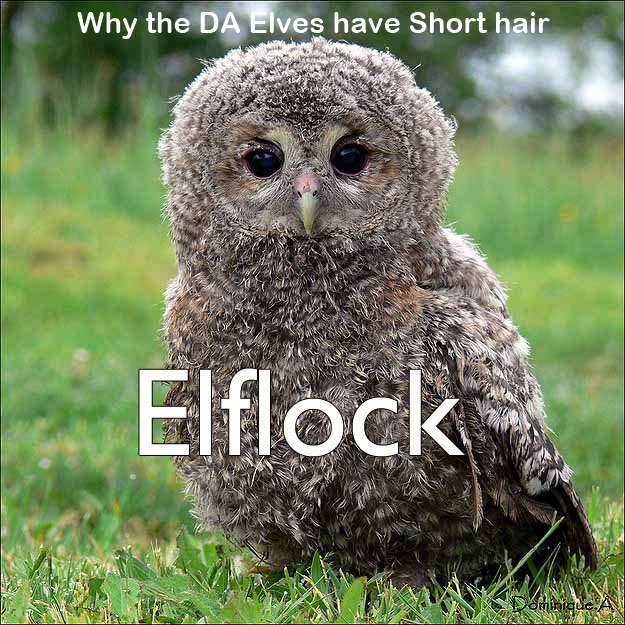Words you’ll probably never use: Elflock
PRONUNCIATION: (ELF-lok)
MEANING:noun: A tangled lock of hair.
ETYMOLOGY: An elflock is a mass of hair supposedly tangled
by elves, as a mother might explain to her daughter while untangling her
snarled locks after a slumber. From Old English aelf. Ultimately from the
Indo-European root albho- (white), which is also the source of oaf, albino,
album, albumen, and albedo. Earliest documented use: 1596. miscible \MISS-uh-bul\
Capable of being
mixed; specifically : capable of mixing in any ratio without separation of two
phases
"Miscible"
isn't simply a lesser-known synonym of "mixable"—it's also a cousin.
It comes to us from the Medieval Latin adjective "miscibilis," which
has the same meaning as "miscible" and which derives in turn from
Latin "miscēre," meaning "to mix." "Miscēre" is
also the ultimate source of our "mix"; its past participle
"mixtus" (meaning "mixed") spawned "mixte" in
Anglo-French and Middle English, and "mix" came about as a
back-formation of "mixte." The suffix "-able" gives us
"mixable," thereby completing its link to "miscible."
"Miscible" turns up most frequently in scientific discussions where
it is used especially to describe fluids that don't separate when they are
combined.
Quaternary
PRONUNCIATION: (KWOT-uhr-ner-ee, kwuh-TUHR-nuh-ree)
MEANING: 1. Of the fourth order.2. Consisting of or arranged
in fours.
ETYMOLOGY: From Latin quattuor (four). Earliest documented
use: 1450.
USAGE: "The patient referral system started at the
primary, to secondary, to tertiary, and finally to the quaternary level of
health care." Jane Kanchense; Zimbabwe's Child Brides; Trafford; 2011.
Depone
\dih-POHN\to assert under oath: testify
"I, Maureen
Watt, depone aat I wull be leal and bear ae full alleadgance tae Her Majesty
Queen Elizabeth," swore the newly-elected Member of the Scottish
Parliament in the dialect of the North-East of Scotland. (Translation: "I
swear that I will be loyal and bear full allegiance to Her Majesty Queen
Elizabeth.")
"Depone," a word used in Scots law for
"testify" since the 15th century, is perfectly at home in the oath.
The word originated from Latin "deponere," meaning "to put
down."
The related English verb "depose," referring to
testimony, entered the language through the same root the following century.
Though used less frequently in American English than "depose,"
"depone" is no stranger to the American court system.
Anatopism
PRONUNCIATION:(uh-NAT-uh-piz-ehm)
MEANING:The error of placing something out of its proper
place; also something placed erroneously.
ETYMOLOGY:From Greek ana- (against) + topos (place).
Anatopism is to place what anachronism is to time. Earliest documented use:
1812.
Snowbroth
PRONUNCIATION: (SNO-broth)
MEANING: Melted snow.
ETYMOLOGY: From Old English snaw (snow) + broth (broth).
Earliest documented use: 1600.
Tourbillion
Tourbillion \toor-BIL-yun\Meaning a whirlwind, a vortex especially of a whirlwind or
whirlpool
"Tourbillion" (which can also be spelled
"tourbillon" and pronounced "toor-bee-YAWNG") comes from
the same root as "turbine"—namely, the Latin word "turbo,"
meaning "top" (as in a spinning object) or "whirlwind."
"Tourbillion" has been used over time to refer to other spinning
objects besides an actual whirlwind. Among watchmaking enthusiasts,
"tourbillion" is the name of a kind of watch with a mechanism
designed to compensate for the effects of gravity on its movement. Among
pyrotechnics fans, a tourbillion is a kind of firework having a spiral flight.
Orgulous
Orgulous \OR-gyuh-lus\Meaning proud, haughty
"In
Troy, there lies the scene. From Isles of Greece
The princes orgulous, their high blood chaf'd,
Have
to the port of Athens sent their ships."
Thus Shakespeare
began the Trojan War tale Troilus and Cressida, employing "orgulous,"
a colorful word first adopted in the 13th century from Anglo-French
"orguillus." After the Bard's day, "orgulous" dropped from
sight for 200 years; there is no record of its use until it was rejuvenated by
the pens of Robert Southey and Sir Walter Scott in the early 1800s.
Twentieth-century authors (including James Joyce and W.H. Auden) continued its
renaissance, and it remains an elegant (if infrequent) choice for today's writers.
Potemkin Village
MEANING: An
impressive showy facade designed to mask undesirable facts.
ETYMOLOGY: After Prince Grigory Potemkin, who erected
cardboard villages to fool Empress Catherine II during her visit to Ukraine and
Crimea in 1787. Earliest documented use: 1904.
Probably the greatest example of persistence is Abraham Lincoln.
Probably the greatest example of persistence is Abraham Lincoln. If you want to learn about somebody who didn't quit, look no further. Born into poverty, Lincoln was faced with defeat throughout his life. He lost eight elections, twice failed in business and suffered a nervous breakdown. He could have quit many times - but he didn't and because he didn't quit, he became one of the greatest presidents in the history of our country. Lincoln was a champion and he never gave up. Here is a sketch of Lincoln's road to the White House:
1816 His family was forced out of their home. He had to work to support them.
1818 His mother died.
1831 Failed in business.
1832 Ran for state legislature - lost.
l832 Also lost his job - wanted to go to law school but couldn’t get in.
1833 Borrowed some money from a friend to begin a business and by the end of the year he was bankrupt. He spent the next 17 years of his life paying off this debt.
1834 Ran for state legislature again - won.
1835 Was engaged to be married, sweetheart died and his heart was broken.
1836 Had a total nervous breakdown and was in bed for six months.
1838 Sought to become speaker of the state legislature - defeated.
1840 Sought to become elector - defeated.
1843 Ran for Congress - lost.
1846 Ran for Congress again - this time he won - went to Washington and did a good job.
1848 Ran for re-election to Congress - lost.
1849 Sought the job of land officer in his home state - rejected.
1854 Ran for Senate of the United States - lost.
1856 Sought the Vice-Presidential nomination at his party’s national convention - get less than 100 votes.
1858 Ran for U.S. Senate again - again he lost.
1860 Elected president of the United States.
Restless mind
Subscribe to:
Posts (Atom)



























.jpg)





















